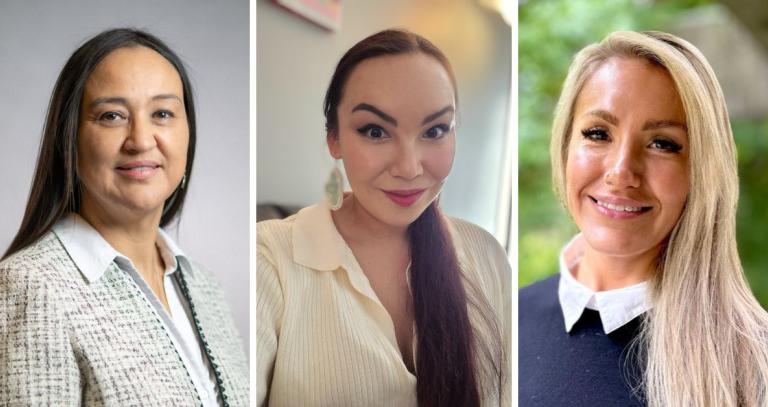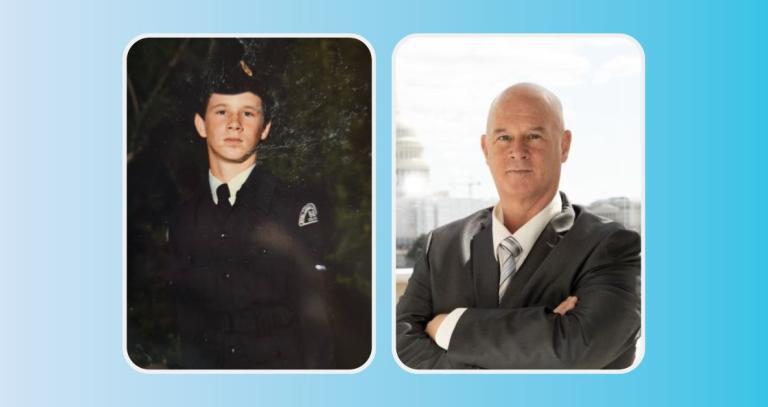An applied business degree to help you gain knowledge and know-how that's in high demand but short supply.
The BCom program at RRU is designed for working adults and professionals like you. Dissatisfied with the status quo, naturally curious, hungry to learn and grow, and motivated to expand your influence and impact.
Complete the last two years of your undergraduate degree over 30 months (or 24 months compressed) through a blend of online courses and three one-week residencies on campus.
Become an entrepreneurial thinker and doer — someone who envisions what's possible and makes it happen.
Unfinished business?
Gain skills and a degree that move you ahead in life.
Learn while you work
Blend of online courses and 3 short residencies.
Boutique experience
Small class sizes, practical learning, high completion rates.
Upcoming offerings
March 30, 2026
Program variation
Application deadline ℹ
Program length
Delivery model
Entry point
Domestic tuition
International tuition
September 28, 2026
Program variation
Application deadline ℹ
Program length
Delivery model
Entry point
Domestic tuition
International tuition
Related Schedules
September 28, 2026
Program variation
Application deadline ℹ
Program length
Delivery model
Entry point
Domestic tuition
International tuition
Related Schedules
March 29, 2027
Program variation
Application deadline ℹ
Program length
Delivery model
Entry point
Domestic tuition
International tuition
Related Schedules
Request more information
An applied business degree for entrepreneurial leaders
Discover an applied business degree designed to develop your capacity to be an entrepreneurial thinker and doer — someone who envisions what is possible and makes it happen.
Complete years three and four of your undergraduate degree (60 credits) and gain the skills and experience to expand your professional opportunities, make a career change, advance an intra or entrepreneurial idea, and take on your next challenge.
Learn while you work
The BCom is delivered primarily online over 30 months (with a 24-month accelerated completion option available) starting each Spring and Fall.
Develop an entrepreneurial edge
The BCom covers the breadth of business and entrepreneurial management with added focus on entrepreneurial discovery and application.
Through relevant, applied, experiential learning, you’ll strengthen your ability to see gaps and pursue opportunities, craft solutions to pressing problems and jump into a project and deliver results. You can also expect to hone your abilities to:
- communicate with clarity and confidence
- collaborate effectively with others
- lead with empathy and insight
- move ideas into action
Program outcomes
BCom grads work in fields as diverse as:
- technology and digital services
- financial services and real estate
- professional services and consulting
- sales, marketing, and business development
- not-for-profits and public and social services
- just about any other field or line of business you can think of - be it B2C or B2B
Designed to help you balance work and studies
This is a degree completion program designed for working professionals who want to learn while they work.
It is an applied, boutique-style program delivered over 30 months (or 24 months compressed) through a blend of online courses and three short (one-week) on-campus residencies.
The program has two intakes/entries per year: Spring and Fall.
Structured flexibility
The BCom is designed to give you the time to engage in your coursework and recharge between terms. Courses run 11-weeks, including a mid-point flex week (reading week). There is a two-week break between courses.
With the 30-month completion option, you will take two courses or 6 credits at a time. This is the strongly recommended program option for those who will be working while learning. Opting for the 24-month compressed completion option requires students to double up their course load in the second half of the program.
Online courses
All courses are actively facilitated by BCom faculty and consist of a mix of synchronous and asynchronous sessions and activities, guided and interactive discussions, and individual and team assignments.
You'll engage with a range of learning resources such as texts, articles, videos, podcasts, and digital collaboration and presentation tools as you navigate your coursework.
On-campus residencies
The program includes three one-week on-campus residencies: at the start, midpoint and end of the program.
Residencies are intensive, immersive, and interactive. Most students say this time together is a highlight of their BCom journey.
During residencies, you can expect to:
- engage in full days of workshops and learning by doing - applying what you are learning in your courses
- participate in co-curricular events and activities
- build and strengthen relationships with classmates, faculty, and staff
Active, applied & collaborative learning
Throughout your time in the BCom, you'll work on a range of individual and team-based applied and experiential projects.
A learning community
As a BCom student, you will be a member of a cohort and supportive learning community. You'll learn from your peers as well as faculty, team coaches and program staff.
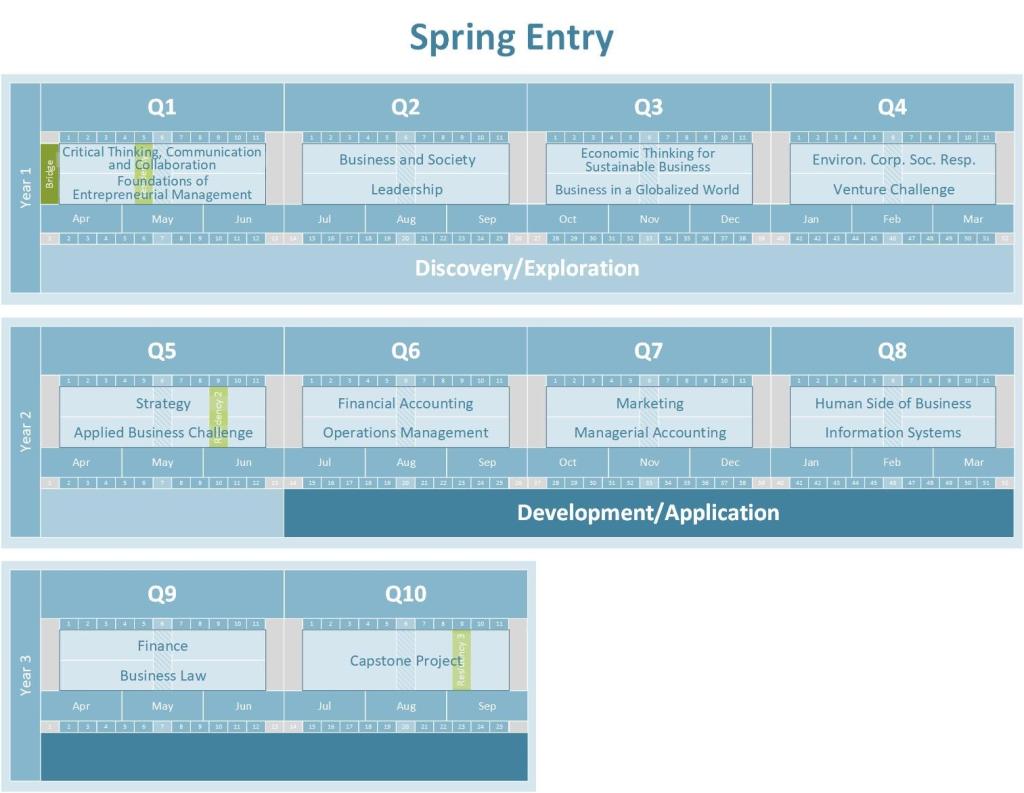
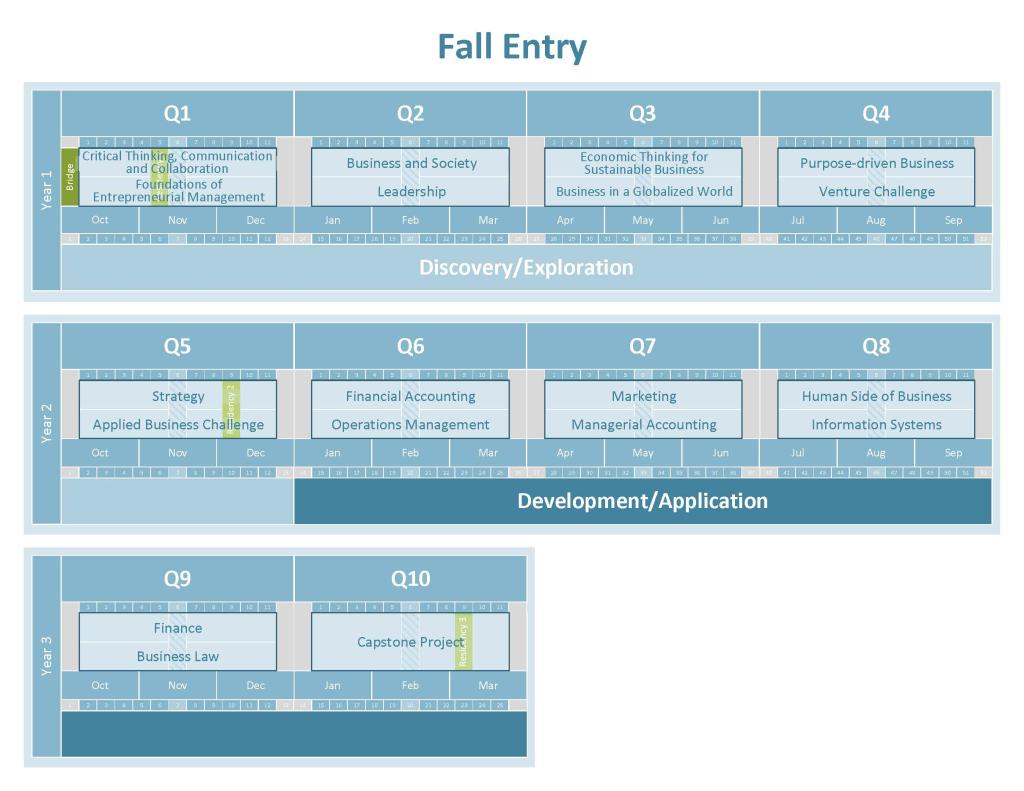
Pathways into the BCom program
You can start your journey toward a Bachelor of Commerce in Entrepreneurial Management in more than one way. Whether you’re coming straight from high school or already have post-secondary or work experience, there’s a pathway that fits your background and goals.
Option 1: Start with an RRU undergraduate diploma
For students coming from high school.
If you’re just beginning your university studies, start by building your foundation through one of Royal Roads’ two-year undergraduate diplomas. These programs include hands-on learning and practical experience that can lead directly into the program once you meet admissions requirements.
Option 2: Enter directly into the BCom program
For students with prior post-secondary or work experience.
If you’ve already completed university credits, a college diploma, or have relevant work experience, you may qualify to enter the program directly.
Our flexible admissions process considers your academic background, work experience, and life learning—not just your grades.
Want to chat about your options?
Courses
Faculty

Associate professor
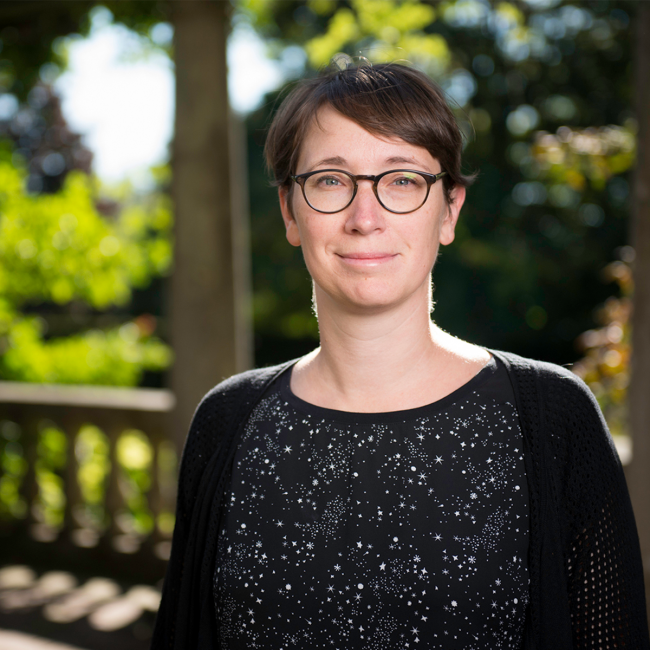
Associate professor
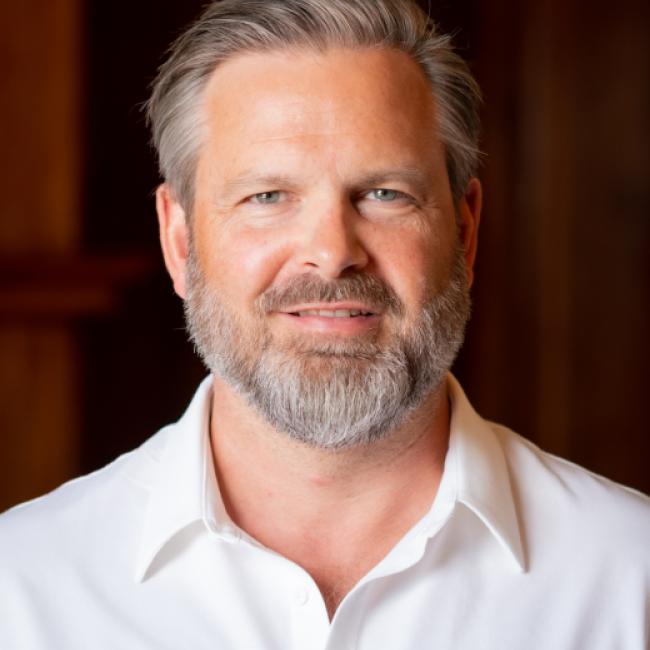
Assistant professor
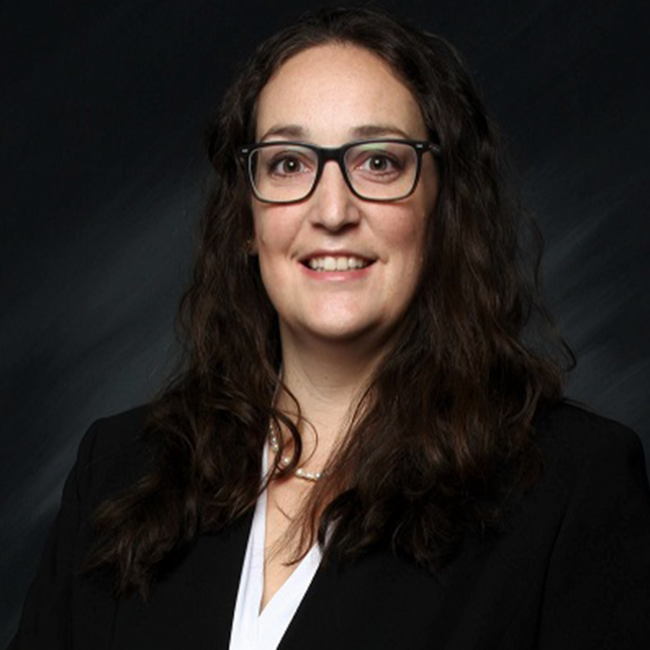
Associate faculty
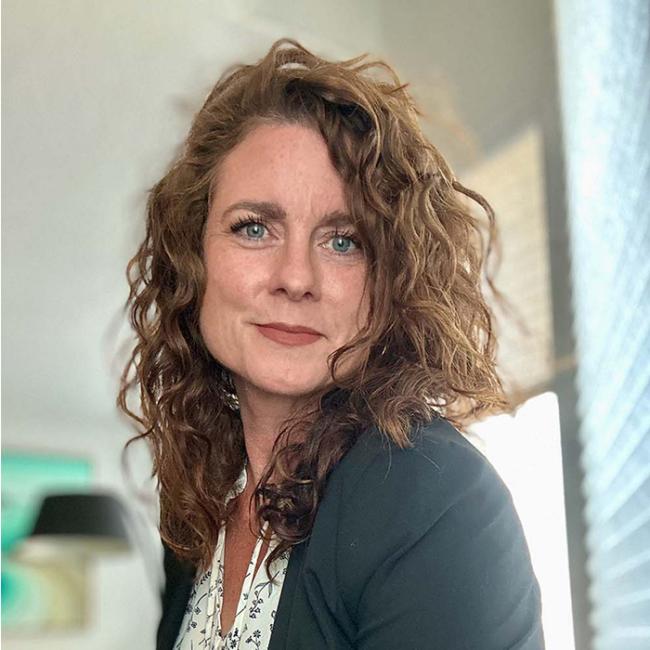
Associate faculty
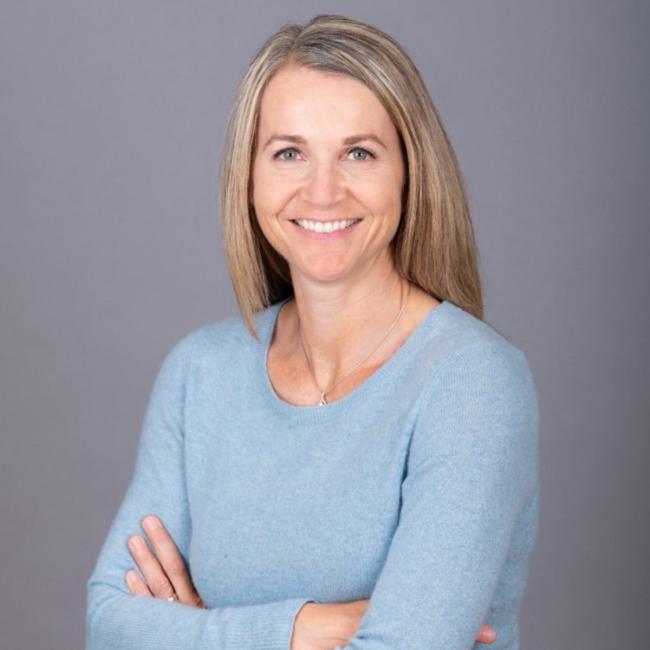
Associate faculty
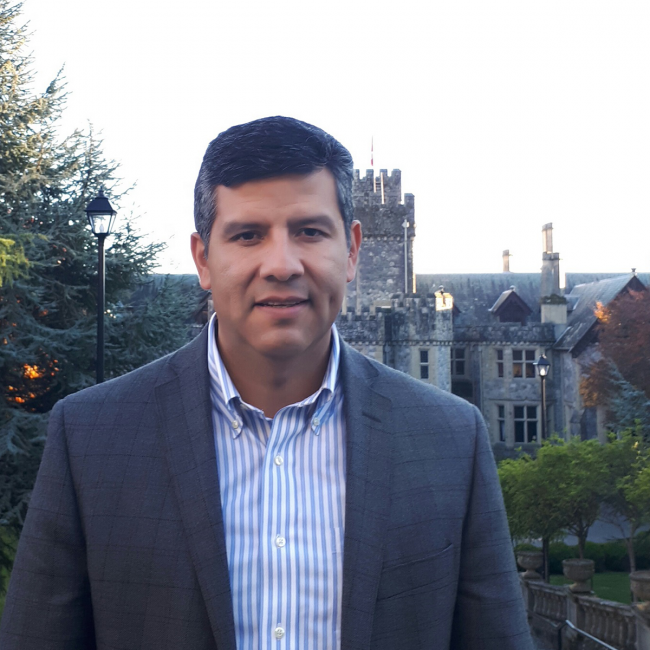
Associate faculty

Associate faculty

Associate faculty

Associate faculty

Associate faculty

Associate faculty
Transfer agreements
Refine results
Pathways into the BCom
Have you been meaning to go back to school to earn a business degree? Are you looking to advance your current career, change things up, or start something new? Do you have a sense of unfinished business? If so, the BCom may be the program for you.
There are two pathways into the BCom program.
Standard admission (academic pathway)
- At least two years of full-time work experience; and
- Equivalent of 60 credits or a two-year diploma (including but not limited to existing transfer agreements) from a recognized post-secondary institution that includes a minimum of 24 second-year credits, with a minimum ‘B’ (3.00/4.33) GPA
Flexible admission (experience pathway)
- For applicants with two or more years of full-time work experience, but do not meet the standard admission requirements, your application may be considered based on a combination of your education, informal learning, and real-world experiences and accomplishments, as per our unique flexible admission policy.
- Our flexible admission policy lets us consider everything you've learned and accomplished, not just your academic record. You may be more qualified than you think.
- Most BCom students enter through flexible admission - providing a pathway and opportunity that few other schools or programs offer and making possible what would otherwise not be viable or available to many prospective students, especially mature learners.
- Note: For applicants with fewer than 15 college or university credits, a minimum of seven years of full-time work experience (with at least three years at a supervisory, management, or project lead level) is generally required.
If you have any questions about admissions to the BCom program, be sure to speak with an Enrolment or Admissions advisor.
Additional admission requirements
All applicants are expected to demonstrate sufficient proficiency in accounting/numeracy and written communications.
Proficiency in accounting/numeracy is evidenced through one of the following:
- Successful completion of relevant courses within an eligible block transfer agreement
- Successful completion of one or more college/university level accounting courses (equivalent to three credits) with a minimum C (63%) grade
- Successful completion of RRU’s Continuing Studies Financial Accounting Fundamentals, with a minimum passing grade, prior to commencing the program*
- Successful completion of two or more college/university courses (equivalent to six credits) in math and/or statistics with a minimum C (63%) grade in each (contact our Admissions team for details)
- In some cases, a minimum of five years of experience in a role that includes substantial financial management responsibilities may be acceptable
Note: Applicants who successfully completed accounting/numeracy courses five or more years ago are strongly recommended to take RRU’s Professional and Continuing Studies Financial Accounting Fundamentals prior to program start.
Proficiency in written communications is determined at the discretion of Admissions or faculty adjudicators and typically evidenced through one or more of the following:
- Successful completion of relevant courses within an eligible block transfer agreement
- Successful completion of a college/university level English composition or academic writing course (equivalent to three credits), with a minimum C (63%) grade
- Successful completion of RRU’s Continuing Studies Academic Writing and Critical Thinking course, with a minimum passing grade, prior to commencing the program
- Other higher education that demonstrates written communications proficiency, as determined by adjudicators
*In limited cases, alternative external course offerings will be considered. If you are considering a course alternative to supplement your application, contact our Admissions team with a course link and outline for review.
English language requirements
If English is not your primary language, please review our English language requirements.
Application requirements
Ready to apply to the BCom program?
Thank you for your interest in the BCom. Please note that your application to the BCom program requires submission of the following information and supporting documents before your file can be assessed.
Application form
In order to apply, you will be required to create a log-in account using your email address. An application fee will be required. If your application fee is being paid by a third party, review sponsored student information. Once submitted, you may check the status of your application at any time.
Missed your application deadline? While we can’t make any guarantees, we may be able to accommodate late applications if there's still space and enough time to process. If you're interested in an intake that is now closed to applications, apply for the next available intake and email Admissions with your preferred start date. Make sure you’re prepared to submit your program's required documents right away. We can't make an admissions decision without them.
Official transcripts
Applicants are responsible for arranging for the submission of official transcripts from all post-secondary (higher education) institutions currently or previously attended, for all credit courses and/or programs. Transcripts are not required for non-credit programs or courses, though you may require proof of professional certifications or designations.
Transcripts are considered official only if submitted directly by the Registrar or other recognized authority of the providing institution in the institution's original, sealed envelope. If the envelope has been opened, the transcripts are no longer official and new (official) transcripts will be required to complete your application.
All international transcripts or credentials are subject to an international transcript and/or credential evaluation.
Detailed résumé (chronological)
- Education: List all post-secondary education, degrees, diplomas, and certificates you have achieved as well as non-credit education you have received.
- Work experience: Include position titles, organization name, length of service (including hours per week worked/performed), and a description of your role, responsibilities, and accomplishments. Entrepreneurial and athletic pursuits can be included here.
- Voluntary/unpaid work experience: List and describe any voluntary/unpaid employment and/or community service experience. Include the name of the organization, length of service, and a description of your role, responsibilities and, accomplishments/contributions.
- Professional memberships and affiliations: List any professional and quasi-professional memberships and affiliations you hold/have held.
- Other relevant information: Provide any other information which you believe is relevant to your application and will be of assistance in assessing your application and suitability for the program.
Additional requirements for flexible admission
For applicants who will be reviewed under the flexible admission process the following additional supporting documents will be required:
Letter of intent
Your goals and motivations are important. Applicants must prepare a letter of intent that speaks to the following questions:
- Why are you applying to the BCom and why Entrepreneurial Management?
- Why do you think the BCom is the right program for you?
- What do you hope to gain from the program? What can you contribute to the program?
- How have you demonstrated the ability to overcome setbacks/challenges, learn new skills, and improve performance over time?
- How will you find the time/create the space to engage in the coursework and the life of the program?
- What are your goals and ambitions beyond the program?
If there is any other information that you feel might be of interest or relevance to your application, please include it in the letter of intent.
Letter of reference
Typically, applicants provide one professional or academic letter. Purely personal references will not be accepted.
Letters should speak to your professional/academic attributes and suitability for the program and be submitted directly by the author to the Admissions office. For example, writers should speak to why they believe you will succeed in the program (and why) and that they believe the program will benefit you (and why). The context in which the writer has come to know you should also be mentioned. There is no set standard for formatting, length or level of detail.
If applicable
- Applicants declaring permanent resident or Convention Refugee status in Canada, must submit a copy of their Permanent Resident Card (PR card) along with their application.
- Transcript evaluation fee or credential evaluation report, if submitting international transcripts.
- An official English language proficiency score report or other evidence of proficiency if English is not your primary language.
- Other information or documents as may be requested to determine your eligibility.
For information on how and where to send your supporting documents, please refer to the document submission guidelines.
Financial aid and awards
Refine results
Alumni Testimonials & Stories
Here's what some recent graduates and alumni have to say about the BCom...
“Thank you for the past two years of education. What I got out of this experience was so much more impactful than I had initially intended. I returned to school to receive 'more tools' in my toolbelt, and I did! Valuable skills like accounting, strategy, and leveraging design thinking through problems to build solutions that create a positive impact. But on a much deeper level, higher education at Royal Roads has taught me to be a better listener, to understand how to be part of a collaborative community, and to learn together. Throughout this journey, I've learned the importance of adapting to new challenges, embracing innovative solutions, and fostering a culture of inclusivity and support. The emphasis on real-world applications and collaborative projects has prepared me to face the dynamic challenges of the business world with confidence and resilience. I am grateful for the opportunities to engage in hands-on learning, participate in insightful discussions, and work alongside such a diverse and talented cohort. We had a special group. The mentorship and guidance provided by [faculty and staff] has been instrumental in my personal and professional growth.” – Business Analyst, 2024 Alum
"I cannot thank Royal Roads and the Bachelor of Commerce in Entrepreneurial Management program enough for preparing me for business ownership and providing me with the skills to navigate through today’s business environment. The nature of the blended program greatly enhanced my communication skills and the ability to build strategic relationships with the key stakeholders that help drive success. I highly recommend the program for those looking to challenge themselves by creating or developing new ideas, taking over and reimaging a current business or looking to improve the organization they are currently involved with. This investment in yourself will be something that you will value forever and use in every situation in both business and life." - Business Owner, 2020 Alum
“The Bachelor of Commerce program at Royal Roads was instrumental in my development as a business leader and as a person. As a working professional and a parent, I found the program to be appropriately challenging but also considerate of the multiple pressures in my life. The professors were passionate about their areas of expertise and committed not only to delivering information but also to ensuring it was absorbed and understood by myself and my fellow learners. Equally significant to me are the friendships I developed during my program, many of whom I remain in contact with years after graduating. In my mind, this program is one of the best available to working professionals looking to develop their business acumen and realize their potential, and I continue to wholeheartedly recommend it every chance I get.” - Company CEO, 2019 Alum
"The philosophy that permeates the Bachelor of Commerce (BCom) program at Royal Roads is that every business idea needs to come into contact with reality. Within this program, you'll have the opportunity to develop your own business concept. It teaches a process to test your ideas. It encourages you to find areas of weakness in your concept, allowing you to improve and build a strong entrepreneurial idea. The program equips you with practical knowledge on how to build a business model, communicate it and manage working relationships. Going into the program, I was attracted to the online-hybrid delivery model. Coming out of the program, I see the RRU BCom as a unique blend of an academic program which gives you the business fundamentals and an entrepreneurial accelerator for a business idea of your choosing." Company Founder & CTO, 2024 Alum
"The Bachelor of Commerce in Entrepreneurial Management didn't just teach me how to start a business, it gave me the tools to thrive within business. The program enabled me to identify opportunities and areas for improvement at my current employer and show intuitive innovation in my critical thinking. Critical thinking was a theme carried throughout the program, with each course giving a different way to learn and adapt critical thinking skills. I would recommend this program to anyone who wants to develop within the business landscape and set themselves apart from others. I have refound my love and passion for learning, and am excited to see what future opportunities await!" - HR Manager, 2022 Alum
"My experience at RRU was fantastic, and it provided a broad range of experience in areas that are key to understanding how businesses start and operate. A valuable benefit of this program is that the majority of the professors who teach the subjects are currently operating their own businesses, which not only provides real-world application for what they are teaching but also provides a valuable source to ask questions that relate to business ideas you may have. A key part of the program is about expanding your thought process and how you approach situations and opportunities, a skill that can be used in all aspects of life. The experience you gain here is valuable if you start your own primary business, have a project on the side, or work for a larger organization as it provides a broad range of knowledge that can help you differentiate yourself. If you go into this program, I encourage you to go in with ideas of businesses or projects you may want to start, and through the length of this program you will be provided the tools to shape those ideas into reality." - Supply Chain Manager, 2019 Alum
“I truly cannot say enough good things about the Bachelor of Commerce in Entrepreneurial Management program at Royal Roads University (RRU). I was well into my career when I entered the program and was able to apply the content I was learning in real-time. The curriculum was relevant, timely, and applicable to the real world, making the program truly valuable and worthwhile. The professors were diverse and subject-matter experts, positioning them to teach the content in a manner that was both interesting and relatable. RRU has perfected the blended learning format - the residencies and online learning fostered an effective learning environment that led to lasting results. The team dynamic supported me at the time and continues to support my approach to teamwork still. I am fortunate to have left the program empowered not only with an undergraduate degree, but with some of my best friends still to this day.” – Director of Operations, 2018 Alum
"Royal Roads University ensures to set students up for success with their blended learning program. I was able to complete my degree while working full-time and raising two boys. Not only did I learn the fundamentals of business management, but the program was based around an entrepreneurial design mentality and developing proficiency in creating value and challenging the status quo. I was previously an individual contributor at the company I work for and have since been promoted to a management position, in part due to the exceptional education I received while attending Royal Roads. I would highly recommend Royal Roads University for anyone who is looking to advance in their career or to simply challenge yourself for personal development." - Business Performance Specialist, 2021 Alum
"I engaged in the RRU BCom program because it provided a distinct program approach that I couldn't find elsewhere. The program was designed for individuals who were already working professionals - something that's a dramatic, foundational shift from programs designed for students right out of high school. The part-time program was designed with flexibility, which allowed me to continue my career growth and family expansion in parallel. It was challenging, but it was achievable. In addition, the cohort of people I met through this program was incredible, coming from a wide range of demographics and industry backgrounds. But something that stood out about this cohort of people was their heightened personal commitment to learning and growth. The program reinforced the development of strong connections, alongside the rigorous curriculum. Completion of my BCom gave me the educational credibility I was aspiring for, along with relationships that still lift me to this day." - Organization Development Manager, 2016 Alum
"There have been few events in my life so significant that they provide a firm demarcation of before and after their occurrence. My experience at Royal Roads University was one such experience. The Royal Roads BCom program was a defining point that provided me with the clarity and tools to pursue my dreams. It both ignited a passion in me and allowed me to better understand myself and what I stand for. Entering as a mature student, the program taught me how to organize and properly articulate my thoughts, and further, to turn these into compelling narratives tailored to the appropriate audience. This quintessential skill serves me daily in my personal and professional life. The program and faculty became invaluable guides for me during this transformative phase. I hold both the institution and staff in extremely high regard to this day. True to the school's motto, which is printed on the mug adjacent to my keyboard as I write this, Royal Roads is Life. Changing." - Project Manager, Commercial Pilot & Entrepreneur, 2018 Alum
"Returning to school to earn my BCom degree in my 40s: ignited within me an insatiable appetite for learning; expanded the lenses which I see the world through; helped me to understand myself better and increased my leadership confidence and competence; helped me to understand others better and the value of collaboration; and increased my confidence in my entrepreneurial life. The RRU BCom gave me new tools and perspectives which have improved my life." - Serial Entrepreneur & Real Estate Professional, 2022 Alum
"The BCom program at RRU is challenging and it will change you. I learned so much about myself over the course of the program and it gave me the confidence to propel my career. I use many of the tools I learned and ways of thinking every single day. The instructors are all so kind, caring, and knowledgeable and are there to see you succeed. The cohort model means you’re never alone and you’ll leave with new friends for life. Was it hard? Yes. Was it worth it? Yes. Would I do it all over again? Absolutely." - College Manager, 2022 Alum
"Entering the BCom program at RRU, I was a seasoned professional with over a decade of diverse experience. Despite my achievements, I felt an educational void and a lack of clarity about my life's direction. RRU's transformative experience was pivotal. Its blended delivery structure enabled me to balance work, family, and academics seamlessly. The chance to connect with peers from all over Canada in British Columbia was exhilarating. The faculty's excellence, marked by their inspiring achievements and effective teaching, deeply impacted me. Post-graduation, I emerged more focused, patient, productive, and adept in teamwork and critical thinking. This growth propelled me towards a master's degree and further professional triumphs. RRU's BCom program stands out as an exceptional choice for working professionals seeking comprehensive education in one of Canada's most stunning university settings." - Police Leader & Adjunct Professor, 2019 Alum
"Joining the BCom program... was a game-changer for me. The experience exceeded all my expectations, challenging me and fostering tremendous personal and professional growth. The cohort model of the program was a highlight. It built a close-knit community among us, enhancing our learning through teamwork and collaborative projects every quarter. Our instructors, with their rich business backgrounds, brought invaluable real-world insights to our classes. Despite the program's intensity and fast pace, it was incredibly rewarding and equipped me with vital skills. For those willing to dedicate themselves and learn quickly, I highly recommend the BCom program at Royal Roads. It's not just an academic pursuit; it's a transformative experience that prepares you for future success." - Marketing Communications Professional, 2018 Alum
"The BCom program through Royal Roads University has been a foundational building block for my career development. I regularly recall learnings from each of the courses and continue to be surprised with how timeless and relevant the content is. What I carry with me most is the network I built through my cohort, the faculty and program team, as well as the life lessons learned that ultimately changed how I approach solving problems and identifying value." - Corporate IT Director, 2020 Alum
"I wanted to continue to learn new things, question my assumptions, and lay the groundwork for additional academic pursuits. The Bachelor of Commerce in Entrepreneurial Management enabled me to do all this and opened up many new and exciting opportunities. The program encourages rigorous critical thinking and offers the chance to become acquainted with the person you have always wished you could become. If you put everything into this program, it will continue to give." - Business Consulting Director, 2022 Alum
"Attending Royal Roads University taught me that I am not just reaching a goal but I am furthering a commitment to being better at whatever I choose to do. The most important lesson I learned is that it is my responsibility to help those who cross my path, make the world a better place, and know that I am never alone in my ventures. Completing my studies created new beginnings in business and in friendships. I look at the opportunities I have with confidence in sharing my new knowledge and in knowing there is much more for me to learn." - Self-Employed Business Consultant, 2022 Alum
"The BCom program was transformative, fostering business acumen, inspiring personal growth, and visionary leadership. It's a program that stays ahead of the curve, seamlessly marrying traditional academic rigour with innovative delivery methods. This progressive approach has prepared me to navigate and excel in the evolving business arena. The depth and diversity of experiences and the profound insights shared by the faculty have greatly expanded my understanding of business... It's a program that doesn't merely educate; it acts as a catalyst, inspiring change-makers and equipping leaders to meet the challenges and opportunities of a global business landscape." - Finance/Treasury Professional, 2021 Alum
"The BCom program was an enriching experience where I was able to develop a wide range of tangible and soft business skills while putting them into practice on ventures that were important to me." - Security Services Specialist & Senior Team Leader, 2022 Alum
"Education is the way to understanding, and Royal Roads allowed me to cater my education to my needs, my interests and, my contribution to society. The Bachelor of Commerce at Royal Roads allowed me to dive into my passions, capitalize on my strengths and give back to my learning community." - Citizen Engagement & Clean Energy Specialist, 2016 Alum
Want to learn more?
Watch our BCom Behind The Scenes webinar series, where we talk to several graduates about their time in the program and life since graduation. Also check out these compelling alumni stories (tip: search by "bachelor of commerce").



